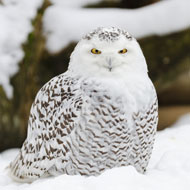Human activity pushing species closer to extinction - Red List
The iconic snowy owl has been listed as threatened for the first time, moving from least concern to vulnerable.
Climate change, poor fishing practices and invasive species are among the threats pushing species closer to extinction, according to the updated IUCN Red List of Threatened Species.
For the first time, the iconic snowy owl has been listed as threatened, moving from least concern to vulnerable on the list. Populations are said to be much smaller than previously thought, declining by 30-49 per cent in three generations.
Climate change is among the threats facing the species, as it affects snowmelt - leading to a decline in the availability of rodent prey.
Poor fishing practices have resulted in steep declines in Irrawaddy dolphins and finless porpoises, which have both been moved from vulnerable to endangered. Populations have more than halved in the past 60 years for the Irrawaddy dolphin, and over the past 45 years for the finless porpoise.
The primary cause of their decline is entanglement in non-selective fishing nets. Protection from entanglement and other threats is “either lacking entirely or largely ineffective”, said Randall Reeves, chair of the IUCN cetacean specialist group.
“Without practical solutions to this problem, the declines of dolphins and porpoises are bound to continue for the foreseeable future,” he added.
Dr Thomas Lacher Jr, a member of the Red List committee, said the uplisting of these two species should act as a “wake up call” and “reinforces the need for aggressive conservation action.”
The updated Red List also reveals a number of mystery extinctions on Australia’s Christmas Island. Three reptile species that were endemic to the island - Lister’s gecko, blue-tailed skink and the Christmas Island Forest skink - are now extinct in the wild.
While the reason is currently unclear, it is thought that predation by the invasive wolf snake could be to blame. The introduction of novel diseases and changes in island ecology, after the introduction of the yellow crazy ant, may have placed further pressure on the species.
Australian ringtail possums are also suffering from the increasingly dry, hot climate. The species has seen an 80 per cent decline in numbers over the past 10 years, prompting it to be uplisted from vulnerable to critically endangered.
In addition, one third of the 46 endemic Japanese snakes and lizards that were newly assessed are threatened. Declines in reptile species across Japan are being accelerated by habitat loss, as a result of unsustainable agriculture and urban development. Collection for the pet trade and threats from invasive species such as the Indian peacock and Japanese weasel are also to blame, according to the IUCN.
On a positive note, some kiwi populations are inclining on small New Zealand islands, thanks to the control of invasive predators. The Okarito kiwi and northern brown kiwi have been recategorised from endangered to vulnerable. Okarito kiwi populations have risen from around 160 in 1995 to 400-450 adults today. Northern brown kiwi populations are growing by over two per cent per annum, though unmanaged populations are still in decline.
Dr Ian Burfield, global science coordinator from Birdlife International, said: “Fortunately, the Kiwi downlistings show that there is hope. New Zealand is a world leader in tackling invasive species, and has developed techniques that have been adapted and used successfully all over the world. What we need now are more resources to scale up these efforts and deploy them on many other islands, before it is too late.”




 The veterinary mental health charity Vetlife is inviting the veterinary community to join it for a sponsored cold-water dip.
The veterinary mental health charity Vetlife is inviting the veterinary community to join it for a sponsored cold-water dip.